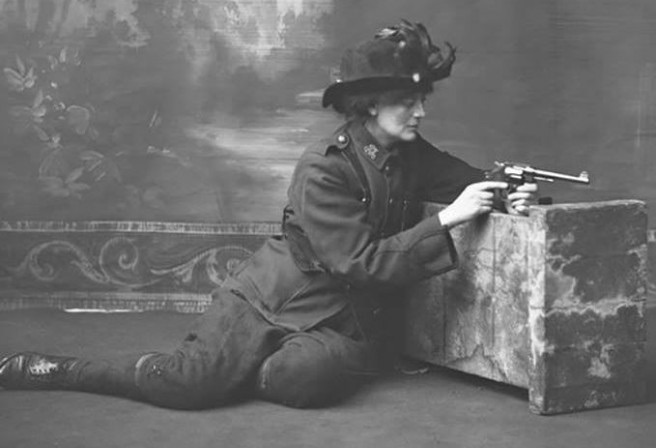
By Jason Porath
Dublin, 1916. Several British officers were enjoying lunch without a care in the world. Suddenly, their meal was given a extra bit of local garnish: shards of glass falling into their plates from windows shattered by gunfire. Ducking for cover, the officers pulled out revolvers and began shooting in the direction of their opponents -- only for the British gunfire to be returned expertly by a woman who would come to bedevil their every moment.
This was Countess Constance Markievicz, a socialite who’d traded gowns and balls for guerillas and bullets.
Weeks later, during her military trial, a young man would describe her assault on British officers to the court -- and again, she responded with blistering firepower. Browbeating the witness into tears, she savaged his testimony until he recanted and changed his statement. All the while she dared the officers standing around to shoot her.
Years later, she’d become the first elected female politician in Ireland or Britain. While incarcerated.
Born Constance Gore-Booth, Madame Markievicz (a title she preferred to countess) was not exactly predestined for a life in the trenches. The daughter of well-to-do landlords, she dismayed her bourgeois family through stubbornly refusing to marry for many years - until she went to art school and there met the penniless Count Casimir Markievicz. After a peculiar courtship that saw Casimir duel men who’d insulted her, the two married. During their wedding vows, she notably omitted the part about obeying her husband.
However, it was soon clear she wasn’t cut out to be a wife or a mother. Constance’s daughter Maeve, as she grew up, was raised by her grandmother instead of Constance herself - to the point that when the two met as adults, they didn’t recognize each other. Similarly, Constance and Casimir’s relationship cooled significantly in the years after their wedding. The root cause of both areas of neglect was Constance finding her one true love: her country.
Ireland’s rebels viewed the smartly-dressed countess with suspicion and outright antipathy. Only through many years of effort did she earn their trust. She stopped standing during God Save the King. She started giving speeches urging outright rebellion. She started a youth training camp that taught boys to shoot the British -- and taught the shooting herself.
She became an icon of sorts for the women of the rebellion. When asked fashion advice, she told women to “dress suitably in short skirts and strong boots, leave your jewels in the bank, and buy a revolver.” In later parades, she showed up so heavily armed “that the casual onlooker might be readily pardoned for mistaking her for the representative of an enterprising firm of small arms manufacturers.”
During one notable procession of the English king through Dublin, she waved a black flag in protest, amidst a sea of the king’s supporters. One royalist showed his disapproval by hitting her on the back with his Union Jack flag - only for the stick holding the flag to abruptly break in two across her shoulders. This was to become a metaphor for her life.
Constance’s assault on the British officers took place during the Easter Rising. During the early stages, Constance was everywhere - nursing, sewing a rebel flag, and delivering messages as one of the highest-ranking members of the rebellion. She later settled into her role as a sniper. Holed up at the College of Royal Surgeons, she spent the majority of the Rising on the rooftop, shooting at British soldiers at the nearby Shelbourne Hotel.
A week in, facing defeat, the rebel leadership spread the order to surrender. Upon receiving word of this, Constance turned herself in with maximum theatricality: gently kissing her gun before handing it over and declaring, “I am ready.”
While many of her cohorts were executed by firing squad, her execution was commuted to life imprisonment. It was an act of mercy she met with fury: “why didn’t they let me die with my friends!?”
She was not to stay in jail long, but she was to be reincarcerated regularly, often with little to no specific cause, throughout the rest of her life.
During one of her stays in 1918, she was elected to parliament, and then became one of the only female politicians in office anywhere in the world. The rebels, under the banner of Sinn Fein, had taken a majority of the parliament seats, and set about establishing an Irish Republic and a government under Dail Eireann.
The brutality of British actions escalated quickly after the elections. Hiring Black and Tans -- bands of ex-soldiers and mercenaries -- to subdue the population, the British actively hunted down the government. Constance and her comrades spent much of their time on the run, but she would usually stay one step ahead. She installed pianos in their office so they would appear to be merely a music school.
Once, when she was about to be raided, she fled the office with sensitive papers in a briefcase. Not knowing where to store it, she put the bag in the window of a friendly secondhand store. She gave the suitcase an outrageously high price tag, and it sat there, in plain sight, for weeks before someone came to retrieve it.
Following the signing of the Anglo-Irish Treaty in 1921, she joined the republican side in the civil war. While the treaty drove the British out from the government in Dublin, their local replacements were scarcely different. This led to another unsuccessful bloody conflict in which Constance again served as a rooftop sniper -- this time against her former comrades. After it, too, failed, Madame Markievicz permanently laid down her arms.
She died in 1927 from complications related to appendicitis. Long years of hunger strikes, police brutality, and guerilla warfare had weakened her body significantly. She was 59.
![[Irish Republican News]](https://republican-news.org/graphics/title_gifs/rn.gif)
![[Irish Republican News]](https://republican-news.org/graphics/title_gifs/harp.gif)

